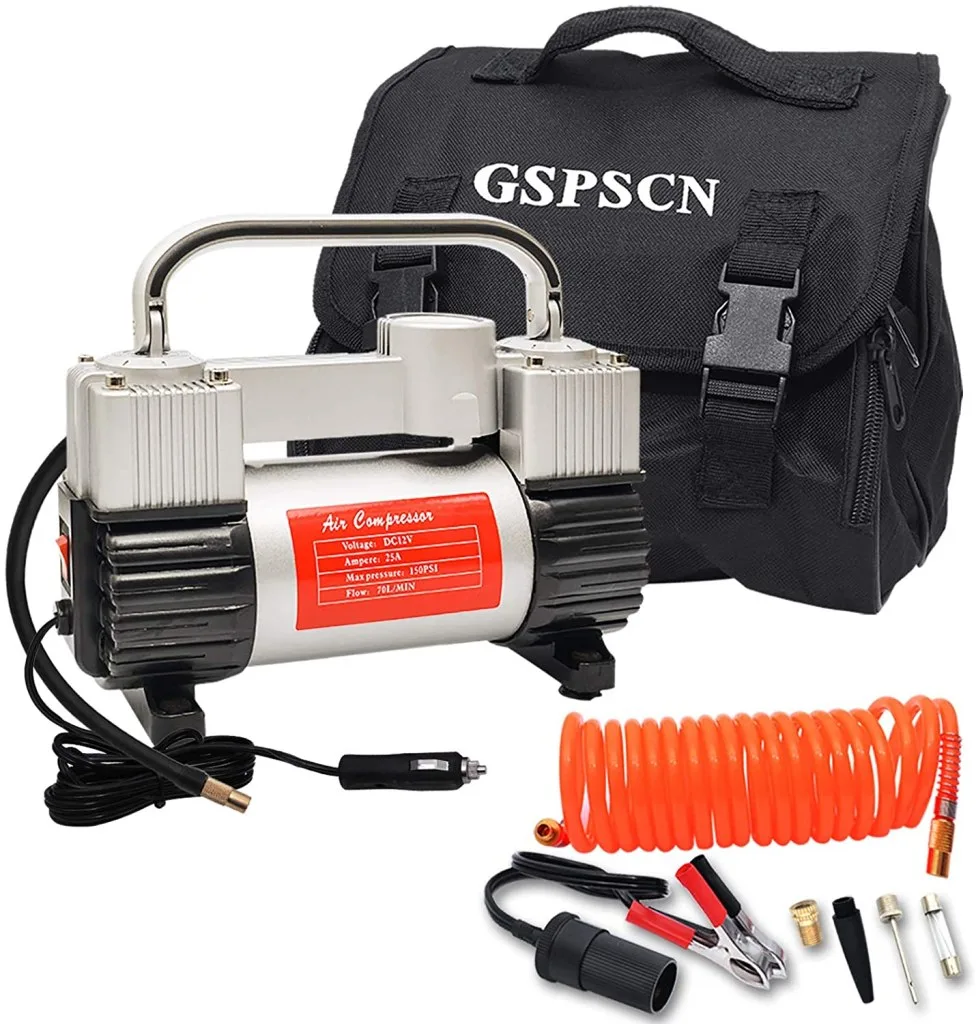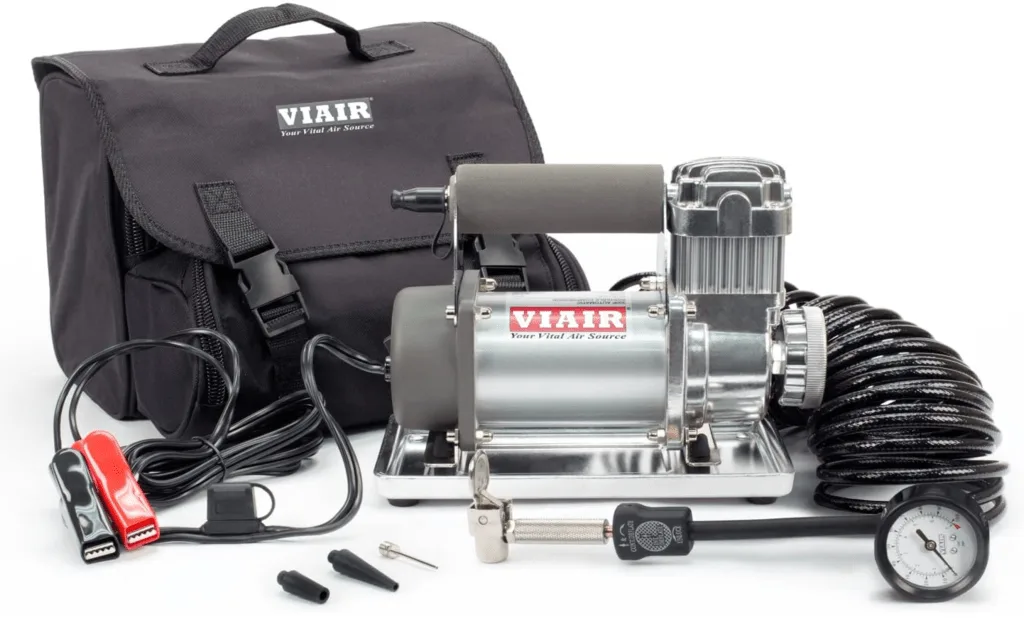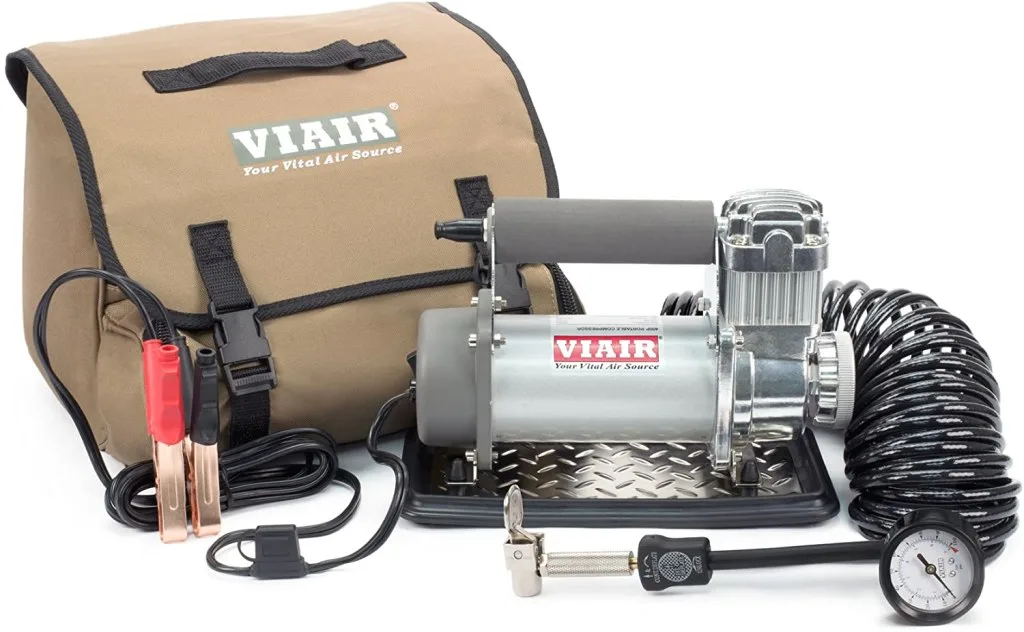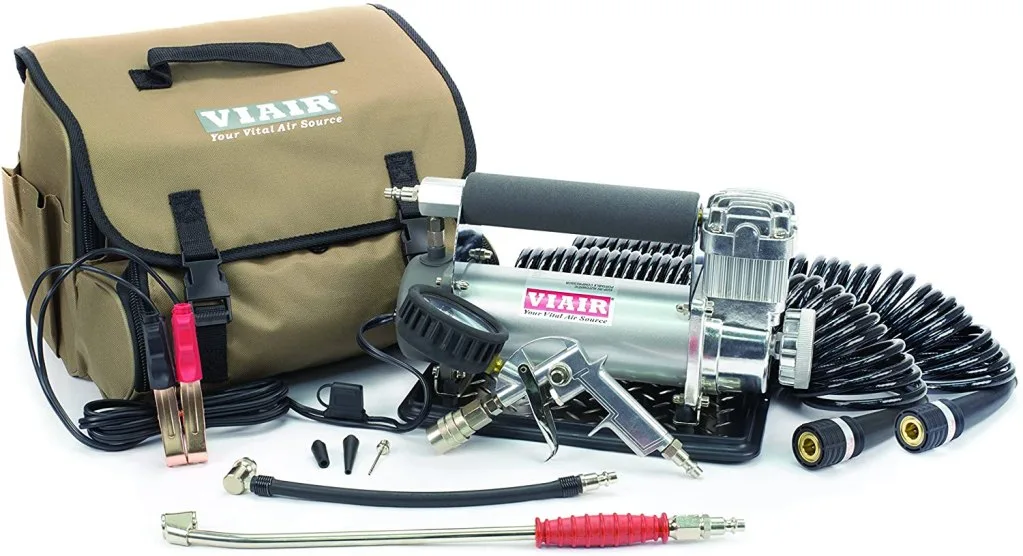Portable Air Compressor: Decent, Better, Best
Hitting the road with a portable air compressor is like carrying a first aid kit. You hope not to need it, but you’re glad to have it when you do.
From pumping up a slow leak so you can limp to the tire store to refilling your deflated basketball, air compressors are useful tools on and off the road. Today, we’ll show you the decent, better, and best air compressors currently available on the market.
Let’s dig in!
What Is a Portable Air Compressor?
Air compressors are common sights in many residential and automotive garages. People use them for vehicle tires, bike tires, sports equipment, and pool floats. Many portable air compressors can do the same jobs as standard air compressors. And being portable makes them perfect for RVers.
Because portable air compressors still require power, manufacturers often equip them with red and black alligator clips.
These clips are similar to what you’d expect to see on battery jumper cables and connect to a vehicle or RV battery. While a portable air compressor may take more time to complete the job, the convenience of having access to an air compressor while on the road is worth the wait.

Considerations for Buying a Portable Air Compressor
There are a few things we think are worth considering before buying a portable air compressor. Let’s take a look.
Size & Portability
Portable air compressors are all relatively compact and made for easy storage when not in use. But some are certainly better than others. You’d be surprised that these air compressors can weigh anywhere from six to 18 pounds despite being compact and portable. They often come in a branded carrying case that makes it easy to store the air compressor and its attachments.
These portable air compressors fit nicely under the rear seats of most trucks. Storing your portable air compressor in your RV storage may initially seem convenient. However, it’s useless if you need air while not towing or are otherwise away from your RV. Storing your portable air compressor in your truck helps ensure you’ll have access to air when you need it most.
PSI Rating
Air compressors have a PSI rating that allows them to use various attachments and utensils. The higher the PSI, the “stronger” the air compressor, and the more capable it is for tougher jobs. The PSI rating is often a key indicator of the compressor’s ability to not only complete a job but in an efficient manner.
Many cheaper portable air compressors have particularly low PSI ratings. Manufacturers made these for airing up sports equipment, bike tires, and on a rare occasion, a small vehicle tire. These certainly aren’t designed for larger trucks or trailer tires requiring 80 or even 100+ PSI. Before spending your money, verify your vehicle and tire pressure requirements and any tools or attachments you plan to use with the portable air compressor.
How It’s Powered
Standard air compressors are powered through standard residential outlets, which are 110-volts. This is a great source of power when it’s available, but you don’t often find outlets on the side of a highway or in a parking lot. Portable air compressors make use of the 12-amp power from the “cigarette outlet” in a vehicle or by connecting via alligator clips to a 12-volt battery.
While both of these power options are great, having a portable air compressor connected via alligator clips to a 12-volt battery is more convenient. There may be an occasion or two where a “cigarette outlet” may not be accessible, but you can find a 12-volt battery in any vehicle. Connecting directly to the battery also minimizes the risk of the outlet overheating and provides more direct power to the compressor. This optimizes the motors and provides a quicker inflation rate.
Noise
Having a flat tire is incredibly annoying for you, but a noisy air compressor can be extremely annoying to your neighbors. There are minimal differences in noise levels between the many different units. In this case, cheaper units often are comparable to their more expensive rivals.
The key difference is how long you’ll be running your noisy air compressor. Cheaper units will take longer to complete the same job and will most likely require a break to avoid overheating. Selecting a higher quality portable air compressor gets the job done faster and prevents making enemies with your campground neighbors.
To help you select the best value and quality air compressor, we’ve ranked some of our favorite portable air compressors on the market. We’ll let you know what we love and don’t like about them, so keep reading!
Decent Portable Air Compressor: GSPCN Tire Inflator
If you’re looking for a value-level portable air compressor, the GSPCN Silver is a great option. This 12V portable air compressor only costs $50-$65 and claims to be rated up to 150PSI with the adapter for a car, truck, SUV tires, or RVs and campers.
GSPCN designed the rubber feet to reduce vibration and noise and ensure the air compressor stays in place during operation. You’ll easily carry the air compressor and all attachments in the GSPSCN carrying case.
Reviews support our rating of this being a decent portable air compressor. Many reviewers state it does a great job airing up small car tires and many recreational tires but struggles with higher pressures. One user timed it taking 12 minutes to reach 110 PSI on his RV.
Twelve minutes might not seem long to some. But GSPCN recommends the compressor has a cool-down after just 20 minutes of work. If you’re airing up multiple tires, you could run into overheating and potentially damage the unit.

Better Portable Air Compressor: VIAIR 300P
The VIAIR 300P is a “better” step up but comes with a $180-$190 price tag. What you’re paying for is a portable air compressor capable of inflating up to 33-inch tires at a swift rate. This unit can operate up to 150 PSI for 15 continuous minutes but will need a 30-minute break to cool down.
The branded VIAIR carrying case stores the compressor, 25’ air hose, PSI gauge, and an assortment of inflation tips. We love this portable air compressor not just for RVs but also for everyday use.
Maintaining your tires at the proper PSI provides optimal performance and longevity from your tires. This compact air compressor is also a great assistant for airing down your tires if you’re planning to drive off-road or in the sand.

Best Portable Air Compressor: VIAIR 400P
The VIAIR 400P is by far the best air compressor on the market but is also one of the most expensive. This 12V air compressor comes with a 25’ hose and can handle practically any job you throw at it. Whether it’s an on-road or off-road vehicle, the VIAIR 400P is rated for tires ranging from 33” to 42” in diameter.
The compressor can flex its muscles for 40 minutes without needing a rest. It’s an inflating machine that doesn’t hiccup or back away from a challenge.
VIAIR included a vibration-resistant diamond plate to provide a strong and durable construction that’s built to last.

Bonus: Best Portable Air Compressor for RVers – The VIAIR 450PRV
VIAIR has recognized that RVers love their portable air compressors and created them for optimal RV usage. The 450PRV comes in at $330-$340 but has everything an RVer could ask for in an air compressor. If you’re planning to use your RV often, especially full-time, we can’t recommend this air compressor enough.
They’ve included 60 feet of air hose, inflation tips, a carrying case. The extra-long hose and inflation tips allow RVers to inflate and adjust tire pressure on the road without needing to hunt down a gas station. With such a long hose, you’ll easily not only your truck tires but your RV as well.
The 450PRV can run for 40 minutes before needing a break.

Buy a Quality Portable Air Compressor
You need your air compressor to work effectively and efficiently when you go to use it. When you’re stuck with a flat tire or trying to help a friend, you’ll regret attempting to save a buck or two by buying a cheap portable air compressor.
We’re confident you’ll love any of the portable air compressors we’ve shared with you today. Has owning a portable air compressor saved your day? Let us know!
We’ll Help You Find the Best Free Camping in the USA
You should give it a try!
As a matter of fact, these free campsites are yours to enjoy. Every time you pay federal taxes, you’re contributing to these lands.
Become a FREE CAMPING INSIDER and join the 100,000 campers who love to score the best site!
We’ll send you the 50 Best Free Campsites in the USA (one per state). Access the list by submitting your email below:
It’s not only psi, but cfm too. There are incredibly cheap $19.95 12v ones that claim 250psi, but the cfm is so low all they’re good for is at most is a bike tire.
However, I’ve been good with a $49 one from Walmart for three years now. It tops off my 80psi tire on my class b in about 3 minutes if you make sure to never let them get too low, which you should never do. Also use it for my bike. I like it because it is smaller and lighter than the the high end ones. Important in a small class b and no tow vehicle to store things.
I don’t need to deal with a completely flat tire. That’s why I pay big bucks for RV road service after all. No point in paying them, then doing the work myself.
And one more reason to own one you didn’t mention, and a main reason I bought one. I’ve found that the majority of air compressors at gas stations only inflate to 70psi. Not much good when your tires need 80psi. Try running 10psi low and it’s blowout time.
Very interesting article. Thank you And also all your other articles. I’m just getting started,so it is good to know about these various items and I read everything.Thanks again